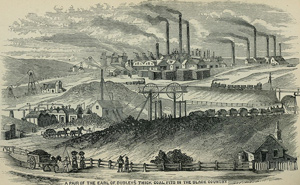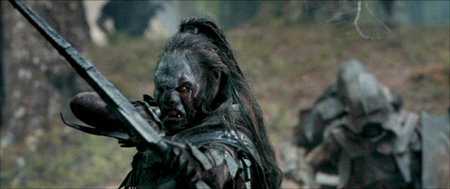This text is from a proposal exploring themes for a potential site-specific work as a component of Jet-Black Futures. To be staged in Walsall, UK.

Different from the ‘advanced’ technological connotations of ‘Jet-blackness’, the ‘blackness’ of the urban spaces positioned to the North and West of Birmingham, traditionally encompassing what are now the four Metropolitan Boroughs of Dudley, Sandwell, Walsall and Wolverhampton, emerged as an allusion to the black soot emanating from the old heavy industries that once covered this area in the aftermath of industrialisation and its legacies.
So visceral was the visual impact of these landscapes of soot and fire, that JRR Tolkien was to famously to have imagined the hellish wasteland of Mordor, featured in ‘The Lord of the Rings’ based around reflections of the Black Country, a connection explored and celebrated in the exhibition ‘The Making of Mordor’ held at Wolverhampton Art gallery in 2014-15.
Beyond the allusions to a landscape stained black by the archaic burning of carbon, another ‘blackness’ has been identified as emerging from Tolkien’s dense ‘legendarium’. A number of commentators (Farrell, Yatt, Ibata, Timpf, etc) have pointed to the figuring of racial metaphor within Tolkien’s writing as articulated through the conflict between the noble and light-skinned forces of ‘Rohan’ and the dark skinned ‘other’ made most graphic by the ‘Orcs of Isengard’ (with the invading ‘Easterlings’ and ‘Haradim’ evoking the terror of an Asiatic/Islamic insurgency).


Viewed in relationship to the landscape of the West Midlands of the early 1950s, this evoking of a contest of terrain between racially encoded and antagonistic forces takes on, I would argue, special historical significance. As Tolkien completed his manuscript for ‘The Fellowship of the Ring’ in 1954, the initial groans of retreat of Empire and the first major waves of migrants from The Caribbean and Indian Sub-Continent (my parents amongst them) would have been becoming visible on the soot caked streets of the West Midlands.
The Black Country shared this experience in common with a number of other areas across the country that also experienced a post-war influx to fill gaps in the labour market. It also shared the full range of responses to this influx, including the racially antagonistic, being expressed elsewhere. (BBC. Racism and ignorance in the Midlands)
However, in terms of evoking the ‘poetic’ language of racial terror, the West Midlands was to emerge as arguably second to none. Ten years after the publication of Tolkien’s epic text, Peter Griffiths, Conservative candidate in the 1964 general election boiled-down racial anxiety in the West Midlands into a single slogan “If you want a nigger for a neighbour, vote Labour”, and in so-doing won the parliamentary seat of Smethwick.

It is the key line from this speech however, that marks it out as a work of ‘speculative futurism’, evoking a vision of a future violent apocalypse played out across an archetypal European cityscape.
At its core, Powell’s bleak diatribe is based on the imagined impossibility of anything but endless antagonism and conflict between different racial groups. Within his male white-supremacist mind-set, having ‘the whip-hand’ was integral to his racial birth-right, and its potential transition from the grip of ‘white men’ to that of ‘black men’ was the stuff of apocalyptic terror and much bloodletting.
Interestingly, Powell never specifies whose blood would end up filling the ‘foaming Tiber’ of his imagination. More importantly, he also utterly fails to allow himself to picture a time beyond the ‘whip’. A time when the assumed inevitability of the domination by one racial group of another is actively challenged, and the mutual enrichment that arises from the embrace and celebration of racial and cultural diversity, escapes his deliberately blinkered gaze .
In the five plus decades since Powell uttered his apocalyptic prediction, the constant and steady labour of anti-racists in the fields of politics, social relations, employment and culture, have ensured that the symbolic ‘Tiber’, though at times turbulent, has remained ‘un-foaming’. That ‘turbulence’ has come in the guise of constant agitation from the far right. It has come as waves of discriminatory social policies in fields such as employment, housing, policing and education. It has come in the form of political utterances playing on invasion anxiety, from Thatcher’s ‘Swamping Speech’ of 1978 to the rhetoric of embattlement that led to the Brexit vote in 2016.
